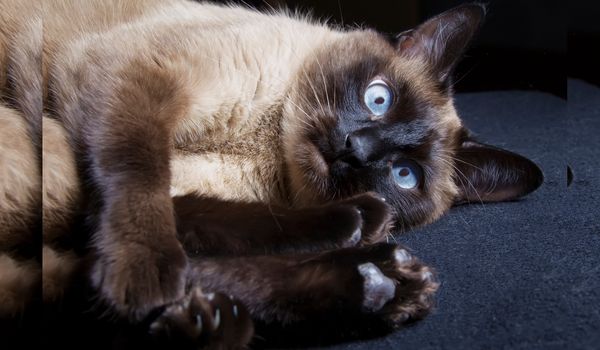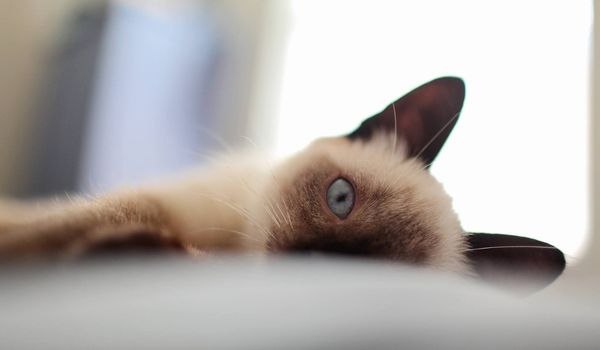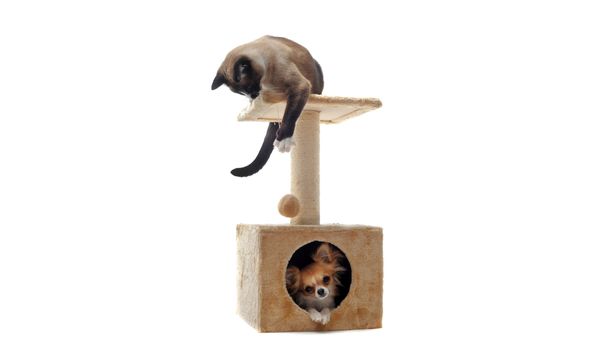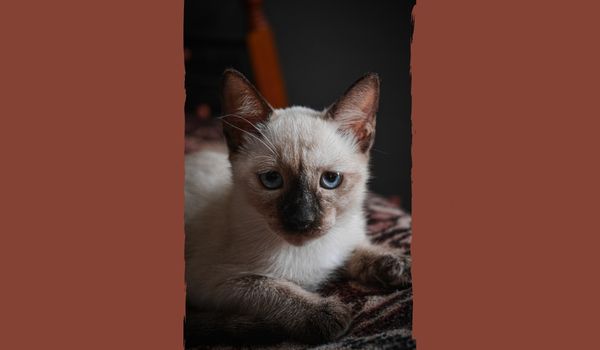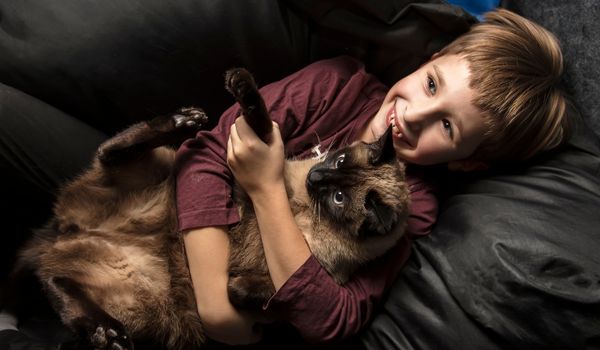The Siamese, one of the most popular pedigreed cats, has an ever-growing fan base. Smitten by its striking beauty, many people flirt with the idea of adding one to their family. But how do they know if it is indeed the right fit for their family?
Discover the Siamese cat’s personality in this article, and dig a little deeper to find the wonders beneath its charming appearance.
What is the Siamese Cat Personality?
The Siamese is an affectionate, intelligent, and social breed of cat. It likes to play and needs sufficient mental and physical stimulus to keep it happy and the house safe from any shenanigans. It lies on the relatively higher end of the aggressive spectrum and therefore needs firm handling to keep its negative traits under control.
But overall, it is a jolly breed that likes to make friends with fellow cats and dogs belonging to breeds compatible with it.
On the flip side, it is needy and, therefore, does not do well in households that fail to offer the presence of humans for a good part of the day. These vocal cats chat away all day to their heart’s content, which could be annoying sometimes.
Siamese cats are also very sensitive and form strong bonds with their caregiver. They happen to be prone to developing separation anxiety, and if left unattended or due to some other triggers, they may develop depression.
Pros
- Loving and caring
- Social, form strong bonds
- Intelligent, can learn to walk on a leash and perform tricks
- Get along with other pets and kids
Cons
- Clingy
- Relatively aggressive
- Very vocal chatty
- Prone to separation anxiety and depression
Breaking Down the Siamese Cat Personality Traits
The Siamese is known as much for its vibrant and social personality as for its delightful point patterns and piercing blue, oriental eyes. But that would be a very superficial estimation of the multifaceted cat.
Below we break down the varying aspects of the Siamese cat personality, hopefully helping you decide whether you are up for the challenge and the cuddles.
1. Affectionate
Siamese cats are very loving, and they like to show it. You will find proof of their undying love with loads of cuddles and demands for one-on-one time. It is in their DNA to be loving and super appreciative of their human. That means they would want snuggles, playtime, and be present wherever their humans are.
These are not the independent types, and if you are aiming to get one, be cognizant of the time and affection they demand.
2. Attention Seeking
The Siamese cat needs your attention, and there is no compromise on that, period. OK, so if a person decides to bring a pet home, they would expect this, right? It is not a surprise, really. Well, dropping all pretense, these cats are needy. They follow their human parents around the house doing chores, having fun, or just relaxing.
If you fail to notice them or pick them up when they drop the hints, they will let you know that this is not cool. You cannot expect to leave them for long hours either. Only get a Siamese if you can find it company for the day, be it a person, a sitter if you wish, or a pet buddy.
And even when you make whatever arrangement suits you, the cat still needs its human. So, you need to spend quality time with it every single day.
3. Social
The sociable and outgoing aspect of their personality makes it easier for them to adjust to a new family. Friendly, curious, and adorable, they can forge strong ties with their family. If you have your friends over, do not think for a minute, the Siamese will go to the back room to relax in its private space.
They like to stay in the moment and enjoy the gathering. That said, remember that too much noise and loud music are still things that upset the pets. If you took the time to teach the cat some tricks, the Siamese might even keep your guests entertained with their quirks and maneuvers. Remember to cover all aspects of animal welfare when considering such an option.
4. Vocal
We bet some of you are aware of these cats’ reputation as a very vocal breed. Nicknamed meezers for this particular aspect of their personality, the Siamese have a low-pitched, loud voice. Compared sometimes to the sound of a crying baby, the Siamese cat will normally talk in a sweet voice. And will amuse their humans with their vocals, whether or not they like it.
While some might find it amusing and enjoyable, others might feel irritated by the constant meowing. Not to mention cats have a range of vocals used to express their myriad of emotions, including pain and anger, which can be pretty loud sometimes.
If they are not neutered, besides the unwanted estrous-related behavior, you may also have to put up with their caterwaul. An ear-piercing howling noise they make when in heat.
5. Moderately Active
Siamese is an intelligent breed and enjoys playing. Moderately active and smart, these cats thrive in an environment filled with fun, engagement, and mental stimulation. Toy mice, feather toys, cat trees, and food puzzles could be some of the fun things this kitty could enjoy.
Leaving them without any interactive play could, in the short term, result in fooling around, taking things out, and possibly damaging furniture or other stuff. Whereas in the long run, it could mess up their mental health.
Often compared to dogs for their social personality and ability to learn tricks, the Siamese can be taught to walk on a leash and play catch. Both these activities are excellent for bonding with your pet and stimulation, which is a cherry on top.
Owners feeling more invested could even try teaching these fireballs of energy some fun tricks. Sure, family get-togethers will be more fun once you achieve this feat.
6. One-Person Cat
Sure, we said the Siamese were social, but that does not put a cap on their capacity to get devoted to one person. It is a trait you could find in several other cat breeds. Only most other breeds would find one person to be worthy of their attention and the center of their affection, whereas the Siamese shows love to the entire family.
But would still get close to only one person.
7. Prone to Separation Anxiety
As we said, this is a very social breed that likes to mingle with people, fellow cats, and even some dogs, depending on their compatibility. And it is not just that they tolerate other pets and people, but they genuinely enjoy having company.
Also, they have the propensity to get attached to their humans as well. So, if left alone for long periods of time, they might develop separation anxiety.
Some of the symptoms cats may develop as a result of separation anxiety include:
- Excessive crying/ vocalization
- Change in appetite
- Elimination outside the litter box
- Displaying destructive behavior
- Excessive grooming
- Getting too attached and not leaving their owner
If you notice any of these signs or even suspect anything, get them to the vet for a professional opinion rather than worrying and speculation. Depending on the individual case, dealing with a situation like this may involve behavior modification, environment modification, and/or medication.
8. May Get Depression
Siamese is a sensitive breed; if it keeps getting ignored, its emotional needs and well-being not given the priority they deserve, it may develop anxiety. And if the situation goes unchecked for some time, chances are high that the condition may progress into a full-blown depression.
While this is not the only explanation for feline depression, a change in environment and several other things could trigger it.
Some of the signs that a cat might have depression are:
- Change in vocalization, possibly hints of sadness
- Getting too needy and clingy
- Pooping in strange places
- Displaying signs of aggression/fear
- Change in appetite
- Excessive sleeping
- Scratching too much
9. Aggressive
OK, so this might put some people off, but these cats have a slightly higher tendency for aggression. But it’s not like they go about biting, threatening, and swatting anyone and everyone that comes in their way. They display signs of aggression in situations of fear, anger, and pain. If your cat is a bit more aggressive, learn how to tame your Siamese cat.
Other situations that could push these cuties to aggression include jealousy, which is when you show affection to another pet or even a person if it makes them feel competitive for your attention. Even seemingly innocent things like petting them beyond their liking could put them off.
If you are dealing with a Siamese kitten, rough play is another form of aggression you may have to deal with.
Here are some of the signs of aggression these cats display;
- Hissing, growling, spitting
- Swatting or attempting to scratch
- Biting
- Ambushing the owners
- Attacking
The best you can do in such situations is to leave them alone. If you see their body tensed, and fixated on something, do not approach them as they might be eyeing something to attack and may dispose of their build-up energy on you.
Discourage their negative behavior by ignoring them when they misbehave and withholding bonding time. Playing with a toy instead of your bare hands is another way to impress upon them that biting or swatting is not something they can do.
10. Gets Along With Other Pets and Kids
Siamese is a social breed, but unless you have had a brush with them earlier, you might not have expected them to get along with other pets. In fact, they crave company so much that experts often suggest getting two Siamese cats instead of one. This way, they get good company all day and a great playmate who understands them. If you want to bring another Siamese cat, explore a few varieties of Siamese cats and choose the one that fits your household.
And it’s not like they only tolerate one of their own kind; when properly introduced, they also forge friendships with other compatible breeds. The compatibility is not limited to other cats either; they get along with suitable dog breeds as well.
And while we are at it, yes, you can bring a Siamese into your home if you have kids, but there are some preconditions to it.
- Kids should be old enough to understand how to treat a pet, meaning no tail pulling or hurting it in any way.
- Small babies and the Siamese in the same home is not a good idea as it will take your attention away from them and they might feel ignored and competitive with the kid.
- If you do not have a Siamese and very small kids, it is better to wait until they grow old. Then they will be able to understand how to handle them and won’t be competing for your affection with the pet but will be able to offer their love to the pet.
Final Words: Siamese Cat Personality 101
Siamese cat has loving, social personality. They do well with compatible breeds of cats and dogs. Smart and moderately active, they need daily stimulus and exercise. Negative aspects include their loudness and too much vocalization, the propensity to separation anxiety and depression, and their capacity for aggression.

